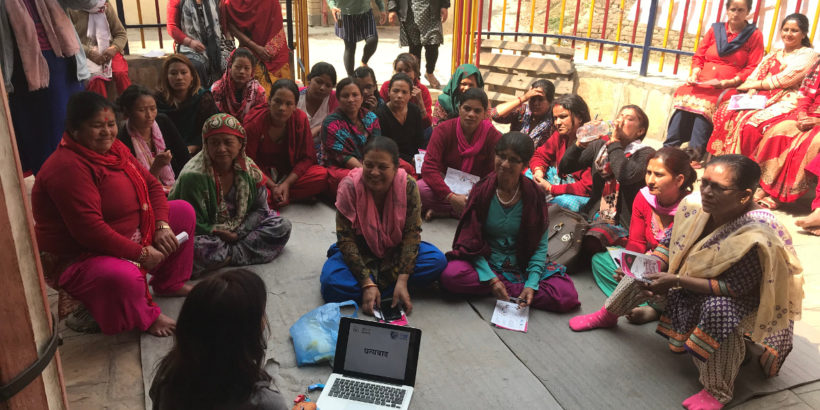Nepal suffers from one of the highest typhoid burdens in the world. The Global Burden of Disease study estimates that, in 2016, Nepal had more than 131,000 cases of typhoid, with 61% among children under 15 years of age. Nearly 1,500 cases of typhoid were fatal in the same year. The Typhoid Vaccine Acceleration Consortium in Nepal (TyVAC-Nepal) and project partners are studying how much typhoid can be averted if children are vaccinated with a typhoid conjugate vaccine (TCV) that has been proven safe and efficacious, and is recommended and pre-qualified by the World Health Organization.
On April 8, 2018, TyVAC-Nepal successfully completed a vaccination campaign. This huge milestone involved vaccinating 20,015 children, aged 9 months to 16 years, in just four months. TyVAC-Nepal will follow each child for two years after vaccination in order to assess TCV impact. These data will help government decision-makers plan for the introduction of TCV into the childhood immunization schedule in Nepal. In order to reach as many children as possible in the study area, we conducted the following public engagement activities, which were critical to the successful completion of the vaccination campaign and continue to be important during the two-year follow-up period:
- Informing locally elected representatives, including the mayor from Lalitpur Metropolitan City where the vaccination campaign took place, about study activities;
- Consulting and collaborating with the local health implementation and community leaders, mothers’ groups, women’s groups, teachers, and other key community stakeholders; and
- Conducting door-to-door public engagement visits to inform parents in the community about the importance of vaccines and to motivate them to participate in the vaccination campaign.
By addressing the queries and concerns of the stakeholders during public engagement activities, those leaders were equipped to play a key role in spreading positive messages to the community. Notable local political figures vaccinated their own children, which inspired members of the community to participate in the study. TyVAC-Nepal also engaged well-known community health workers to conduct field activities, which helped built trust. These community health workers are the backbone of the national health system and play an important role in other national health programs in Nepal. Their broad community outreach had a significant positive impact on recruitment.
Extensive staff training and orientation was also critical to our success. We trained staff to use simple phrasing and local language to deliver information about the study. This approach helped parents and caregivers appreciate the value of vaccinating their children.
Despite achieving our target, the journey was not always easy. This was the first large-scale vaccine trial conducted in this area, and a whole new experience for this community, which naturally prompted questions. Parents wanted to know if their child was receiving the TCV or the control vaccine. They were also skeptical about the safety of the vaccines because they were given at no charge. The parents were reassured by the participation of Patan Hospital, where most people from the study area seek healthcare services. TyVAC-Nepal and partners went above and beyond to alter the vaccination schedule to work around school schedules, exam sessions, and festivals as both parents and children were occupied in these activities and events.
During the two-year follow-up period, all participants will have access to a doctor and a free blood test if they have a fever above 380C and/or that lasts for two days or more. The information about this free service provided by Patan Hospital helped enrollment.
For the days to come, TyVAC-Nepal continues to conduct public engagement activities to educate the community about typhoid, burden, mode of transmission, and prevention. These activities are crucial to the study and to further inform the community about ongoing TyVAC-Nepal activities in their area.



